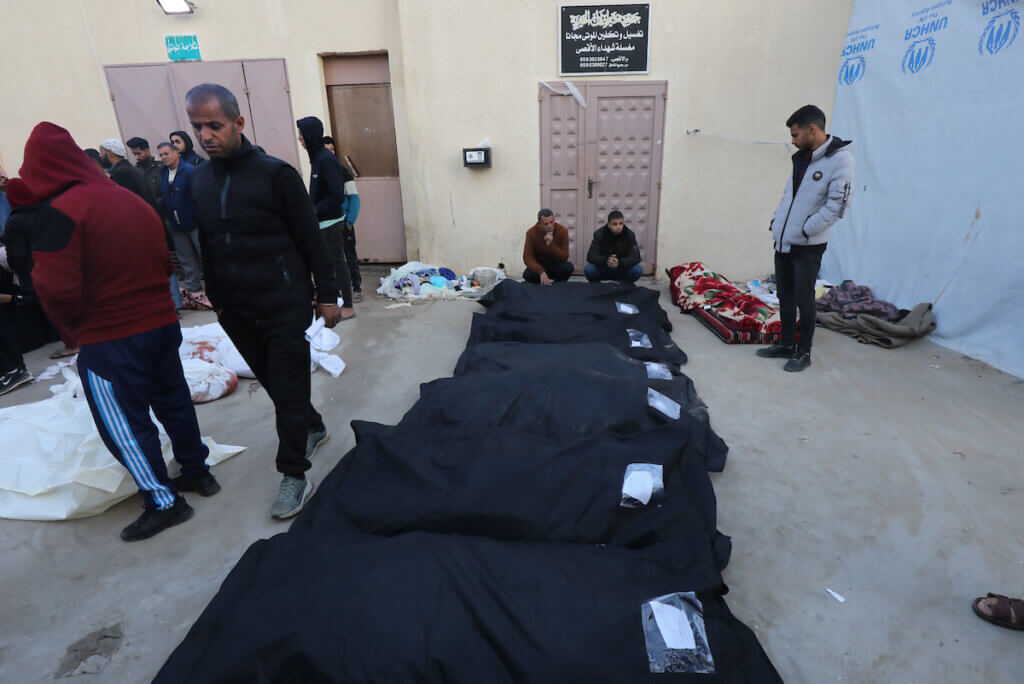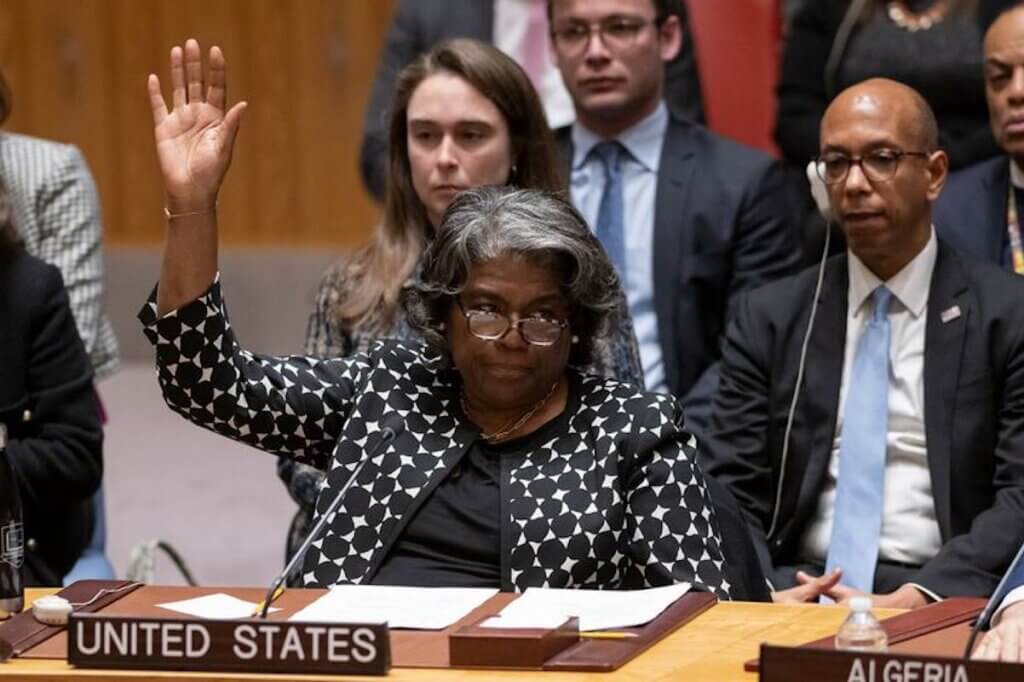‘Operation Al-Aqsa Flood’ Day 138: U.S. vetoes another UN resolution calling for ceasefire in Gaza
The U.S. vetoed another resolution in the UN Security Council calling for a Gaza ceasefire as the WHO evacuates 32 critical patients from besieged Nasser Hospital, and the World Food Program is forced to suspend distribution amid mounting famine.

Casualties
- 29,313+ killed* and at least 69,333 wounded in the Gaza Strip.
- 380+ Palestinians killed in the occupied West Bank and East Jerusalem
- Israel revises its estimated October 7 death toll down from 1,400 to 1,147.
- 576 Israeli soldiers killed since October 7, and at least 3,221 injured.**
*This figure was confirmed by Gaza’s Ministry of Health on Telegram channel. Some rights groups put the death toll number at more than 36,500 when accounting for those presumed dead.
** This figure is released by the Israeli military, showing the soldiers whose names “were allowed to be published.”
Key Developments
- For a fourth time. U.S. vetoes UN Security Council resolution calling for immediate humanitarian ceasefire in Gaza Strip.
- Saudi foreign ministry says, “There is a need now more than ever to reform the Security Council to carry out its responsibilities in maintaining international peace and security with credibility and without double standards.”
- Israel’s Finance Minister Bezalel Smotrich says returning captives was “not the most important thing” as Netanyahu’s government is focused on destroying Hamas.
- WHO says it led two rescue missions in past days, evacuating 32 critical patients from Nasser Hospital.
- At least 130 patients and 15 doctors and nurses remain inside Nasser Hospital’s Intensive Care Unit (ICU), which is no longer functioning
- PRCS says Israel blocked eight attempts to deliver food and medical supplies to Al-Amal Hospital, which is at risk of running out of fuel and drinking water.
- World Food Programme says it is pausing supplies to north Gaza. WFP director says, “famine doesn’t have to happen. But if things don’t change, it will.”
- Israeli forces kill Aaref Marwan Aaref, 26, from Qalqilya town.
- Khaled Al-Shawish, 53, from Al-Fara’a refugee camp dies inside Israeli jail.
U.S. veto in Security Council “implies an endorsement of the brutal violence and collective punishment“

The U.S. vetoed an Arab-backed resolution in the UN Security Council on Tuesday, which called for an immediate humanitarian ceasefire in the Gaza Strip.
This is the fourth time Washington has used its power to block the Security Council from bringing an end to the Israeli war on Gaza since October.
The resolution was put to vote by Algeria despite the U.S. being expected to strike it down.
The U.S. ambassador to the UN, Linda Thomas-Greenfield, said that Washington was “concerned” the resolution would jeopardize efforts ushered by Egypt and Qatar to bring a deal to pause the fighting and exchange hostages between Israel and Hamas movement.
Early in February, mediated talks reached a deadlock when Israel’s war cabinet rejected Hamas’s counter-deal to release hostages in stages over a period of four and half months in exchange for Palestinian prisoners, including national figures serving life sentences.
The U.S. veto garnered disappointment in Arab capitals, including allies such as Saudi Arabia, which still hopes the U.S. administration will rein in Israel.
“There is a need now more than ever to reform the Security Council to carry out its responsibilities in maintaining international peace and security with credibility and without double standards,” the Saudi foreign ministrysaid on Tuesday.
Algeria, which put in a draft for the resolution two weeks ago, said silence over Israeli aggression in Gaza was not an option.
“This resolution is a stance for truth and humanity, standing against the advocates for murder and hatred,” Amar Bendjama, the Algerian ambassador to the UN, said.
“Voting against it implies an endorsement of the brutal violence and collective punishment inflicted upon them [the Palestinians],” he added.
Zhang Jun, China’s ambassador to the US, said that “the U.S. veto sends a wrong message, pushing the situation in Gaza into a more dangerous one… the continued passive avoidance on an immediate ceasefire is nothing different from giving a green light to the continued slaughter.”
The U.K. had abstained, while 13 members of the Security Council voted in favor.
In the past week, the U.S. drafted and circulated another rival resolution that would call for a “temporary ceasefire” and lifting restrictions on supplying humanitarian aid into Gaza, on the condition that Hamas release all the hostages first. It is yet to be scheduled for a vote.
The release of Israeli captives has been a constant line in U.S. official statements, yet, on Tuesday, Israel’s Finance Minister Bezalel Smotrich said that returning captives was “not the most important thing”, according to The Times of Israel, as Netanyahu’s government is focused on destroying Hamas.
WHO evacuates more critical patients from Nasser Hospital
In the past 24 hours, Israeli forces committed 11 “massacres” in various areas of the Gaza Strip, according to the Gaza Ministry of Health on Telegram, killing at least 118 Palestinian martyrs and injuring 163 people.
The Palestine Red Crescent Society (PRCS) said it evacuated another 21 injured people from the Nasser Hospital in Khan Younis overnight. The medical complex has been under Israeli fire and siege since mid-January.
PRCS’s evacuation mission was coordinated with the World Health Organization (WHO), and transferred patients and the injured to field hospitals in Rafah for treatment.
Wafa news agency reported that Israeli artillery bombed the vicinity of the Nasser Hospital on Wednesday morning, where at least 120 injured and patients remain inside it.
WHO posted video footage of the evacuation mission from inside the Nasser Hospital, which was cloaked in darkness due to a lack of fuel to operate electric generators. WHO said that it led two rescue missions in the past days, evacuating 32 critical patients from the hospital.
“Weak and frail patients were transferred amidst active conflict near the aid convoy. Road conditions hindered the swift movement of ambulances, placing the health of patients at risk,” WHO wrote on the X platform along with a video.
WHO used four PRCS ambulances to transfer patients to the European Gaza Hospital in Khan Younis, Al-Aqsa Hospital in Gaza City, and the International Medical Corps, the UAE and Indonesia field hospitals in Rafah.
A doctor with the WHO recorded a video inside the Nasser Hospital on Tuesday evening, describing how the medical facility has been for days without electricity or running water.
“Medical waste and garbage are creating a breeding ground for disease. WHO staff said the destruction around the hospital was ‘indescribable.’ The area was surrounded by burnt and destroyed buildings, heavy layers of debris, and no stretch of intact road,” WHO said.
The Intensive Care Unit (ICU) no longer functions in the Nasser Hospital, where at least 130 patients and 15 doctors and nurses remain inside it.
Dr Ashraf Al-Qidra, Gaza’s Ministry of Health spokesperson, said on Wednesday that eight patients died inside the Nasser Hospital in the past four days due to a lack of electricity to operate medical gear.
“The bodies of the eight martyrs began to swell and show signs of decomposition, posing a danger to other patients,” Dr. Al-Qidra said on Telegram. “The Israeli occupation refuses to remove the bodies of the martyrs so that they can be honored with burial, which is their most basic human right.”
Palestinian families have had to bury their relatives in the yards of hospitals on numerous occasions since October, as Israeli forces sieged and assaulted the facilities in the Gaza Strip. In late January, Palestinians, under the risk of being shot by Israeli snipers, had to bury 150 bodies inside the Nasser Hospital courtyard.
PRCS warned on Wednesday that the Al-Amal Hospital in Khan Younis remains under Israeli forces’ siege. PRCS said that Israel blocked for the eighth time an attempt to deliver food and medical supplies to the Al-Amal Hospital, which is at risk of running out of fuel and drinking water. Seven members of Al-Amal staff remain in Israeli detention since the facility was stormed in early February.
PRCS also said that Israeli forces have continued to jam cellular signals and disrupt landline and internet communication with the outside world for the past 36 days, Wafareported.
World Food Programme pauses supplies to north Gaza
A hearing at the International Court of Justice(ICJ) looking into the legality of Israel’s military occupation of the West Bank, East Jerusalem, and the Gaza Strip continues for the third day on Wednesday.
More than 50 nations will address the UN’s highest court, which is expected to result in a non-binding legal opinion by the judges on Israel’s occupation of Palestinian lands captured in June 1967. The hearings will conclude on February 26.
Meanwhile, the World Food Programme (WFP) said that it is pausing supplies to north Gaza.
WFP director, Cindy McCain, wrote on X platform “We’ve had to make the impossible choice to pause aid distributions in Northern Gaza. There’s an incredible level of desperation against the backdrop of immense humanitarian need.”
She added that “famine doesn’t have to happen. But if things don’t change, it will.”
Israeli forces had blocked nearly all aid trucks from reaching north Gaza. Conveys had to pass through a military checkpoint on Salah El-Din Street, a major route connecting southern and northern Gaza.
In recent weeks, Israeli forces began constructing a fortified east-to-west highway, splitting the Gaza Strip into two. Israeli bombardment of neighborhoods in north Gaza blocked roads with debris, hindering vehicles from driving on them.
On Sunday, WFP resumed its operation in north Gaza following a three-week pause. However, convoys sent on Sunday and Monday faced difficulties distributing food and were met by large crowds of people near Gaza Valley, with some desperate Palestinians climbing aboard the trucks.
“Nutrition screenings conducted at shelters and health centers in the north found that 15.6 per cent – or 1 in 6 children under 2 years of age – are acutely malnourished,” WFP said in a statement.
“Gaza is hanging by a thread and WFP must be enabled to reverse the path towards famine for thousands of desperately hungry people,” it added.
Palestinian prisoner dies in Israeli detention
As the month of Ramadan is nearing on March 10, the occupied West Bank and Jerusalem appear to be at the breaking point.
An advisor to the Palestinian Authority’s (PA) President Mahmoud Abbas, told the The National that Israel’s plan to restrict numbers of Palestinians visiting Al-Aqsa Mosque in East Jerusalem could explode the whole region.
Sabri Saidam said “Ramadan is a holy month and emotions are charged even further, so things will escalate beyond the borders of Palestine… Maybe it will get worse – much worse.”
The Israeli opposition figure, Yair Lapid, called for stripping powers from Itamar Ben-Gvir, the Minister of National Security in charge of Israeli police, who vowed to limit Palestinians from accessing Al-Aqsa during Ramadan.
“It is impossible to go to Ramadan with such a chaotic man in charge… [Ben-Gvir] is unable to maintain Israel’s security,” Lapid said.
Overnight, Israeli forces arrested tens of Palestinians from the towns of Hebron, Jenin, Jalazoun refugee camp, and Ramallah. It also stormed Jenin, and killed Aaref Marwan Aaref, 26, from Qalqilya town.
On Wednesday, the Prisoners’ and Ex-Prisoners’ Affairs Authority and the Prisoners’ Club said that Khaled Al-Shawish, 53, from Al-Fara’a refugee camp north of Tubas, died inside Israeli jail.
He has been detained since May 28, 2007, and has been sentenced to 11 life sentences. Al-Shawish is the ninth Palestinian prisoner to die while in Israeli detention since October and the 246 prisoners since June 1967.
He was chronically ill and bound to a wheelchair after being shot by Israeli forces in 2001. He was a member of the Forces 17 within the PA in the 1990s, when he served four years in prison.
Wafa reported that Israel arrested him once again in 2007 and sentenced him to 11 life sentences for his political activism. He leaves a wife and four children, one of them, Qutaiba, who spent five and half years in prison.
Shawish saw his brother Musa being killed by Israel in 1992. One of his brothers, Mohammed, spent 11 years in Israeli jail, and the other, Nasser, is currently serving five life sentences.


No comments:
Post a Comment